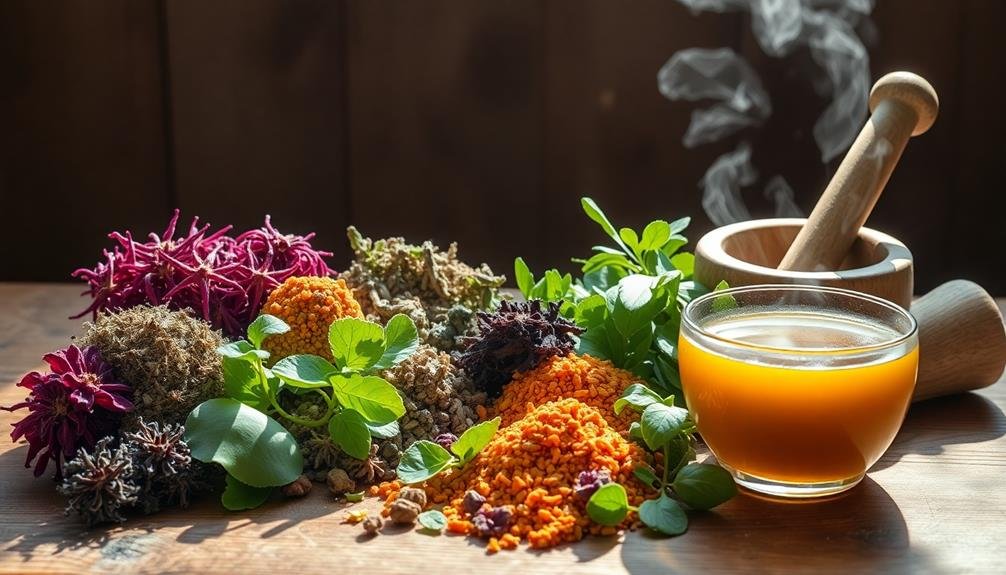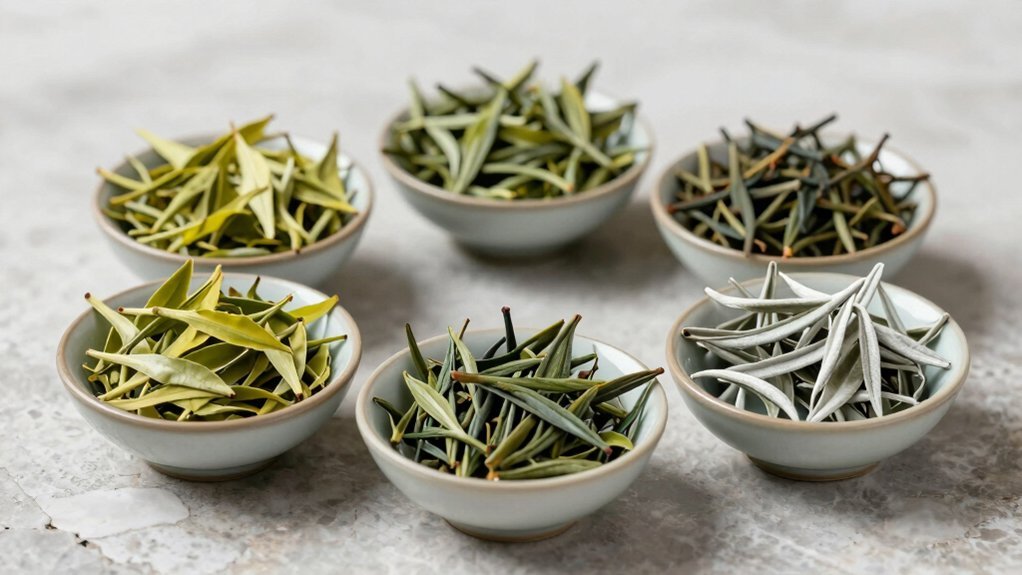Adaptogenic herbs boost your immune system naturally by helping your body adapt to stress and maintain balance. These powerful plants regulate your stress response, reducing cortisol levels that can suppress immune function. By modulating your hormones and supporting overall wellness, adaptogens like ashwagandha, rhodiola, and astragalus enhance your body's resilience against pathogens. They work synergistically with your immune system, increasing the activity of natural killer cells and T-cells. Unlike stimulants, adaptogens provide sustained support without crashes, promoting long-term health. By incorporating these herbs into your daily routine, you'll not only strengthen your immune defenses but also improve your energy levels and stress management. Discover how to harness the full potential of these natural immune boosters.
Understanding Adaptogenic Herbs

Adaptogenic herbs have been in use for centuries across various traditional medicine systems. These powerful plants help your body adapt to physical, chemical, and biological stressors. They work by regulating your body's stress response, promoting balance and homeostasis.
Unlike stimulants that provide a quick energy boost, adaptogens offer sustained support without causing crashes or jitters. They're known for their ability to normalize bodily functions and enhance overall resilience. Common adaptogenic herbs include ashwagandha, rhodiola, ginseng, and holy basil.
These herbs typically contain unique compounds that interact with your body's stress response system, including the hypothalamic-pituitary-adrenal (HPA) axis. By modulating cortisol levels and other stress hormones, adaptogens help your body maintain equilibrium under challenging conditions.
You'll find that adaptogenic herbs can improve various aspects of your health, from energy levels and cognitive function to immune system support. They're often used to combat fatigue, enhance mental clarity, and boost physical endurance.
While each adaptogen has its specific benefits, they all share the common trait of helping your body resist stressors and maintain peak function.
The Immune System Basics
Imagine your body as a fortress, constantly under siege from invaders. That's fundamentally what your immune system deals with daily. It's a complex network of cells, tissues, and organs working tirelessly to protect you from harmful pathogens.
Your immune system has two main components: innate and adaptive immunity. Innate immunity is your body's first line of defense, responding quickly but non-specifically to threats. Adaptive immunity, on the other hand, develops over time and targets specific pathogens.
| Immune System Component | Function | Response Time |
|---|---|---|
| Innate Immunity | General defense | Immediate |
| Adaptive Immunity | Specific defense | Days to weeks |
| Memory Cells | Long-term protection | Rapid upon reinfection |
To maintain a strong immune system, you need to support it with proper nutrition, regular exercise, adequate sleep, and stress management. That's where adaptogenic herbs come in. They can help your body adapt to stress and maintain balance, indirectly supporting your immune function.
Understanding the basics of your immune system is vital for appreciating how adaptogenic herbs can enhance its performance naturally.
Stress and Immune Function

One of the most significant factors affecting your immune system's performance is stress. When you're under stress, your body releases cortisol, a hormone that can suppress immune function. Chronic stress leads to prolonged cortisol elevation, which can leave you more susceptible to infections and illnesses.
Stress impacts your immune system in several ways. It reduces the number of lymphocytes, white blood cells vital for fighting off pathogens. It also decreases the effectiveness of natural killer cells, which are responsible for identifying and destroying harmful invaders. Additionally, stress can increase inflammation in your body, further compromising your immune defenses.
Your lifestyle plays an essential role in managing stress and supporting immune function. Regular exercise, adequate sleep, and a balanced diet can help mitigate the negative effects of stress on your immune system.
Mindfulness practices like meditation and deep breathing exercises can also lower cortisol levels and boost immune function.
Understanding the link between stress and immunity is essential for maintaining peak health. By recognizing the impact of stress on your body's defenses, you can take proactive steps to support your immune system and enhance your overall well-being.
Top Adaptogenic Herbs for Immunity
While managing stress is essential for immune health, certain herbs can provide additional support. These adaptogenic herbs help your body resist stressors and maintain balance. Here are some top adaptogens for boosting immunity:
| Herb | Benefits |
|---|---|
| Ashwagandha | Reduces stress hormones, enhances T-cell function |
| Eleuthero | Increases natural killer cell activity, boosts energy |
| Rhodiola | Improves stress resilience, supports antiviral defenses |
| Astragalus | Stimulates immune cell production, fights inflammation |
| Reishi | Modulates immune response, enhances antioxidant activity |
These herbs work by regulating your body's stress response and supporting overall immune function. Ashwagandha, for example, can help lower cortisol levels and improve white blood cell counts. Eleuthero may increase your resistance to infections, while Rhodiola can help combat fatigue and enhance mental clarity during stressful periods.
Astragalus is known for its ability to stimulate the production of immune cells and reduce inflammation. Reishi mushrooms, on the other hand, can modulate your immune system and provide powerful antioxidant support.
When incorporating these adaptogens into your routine, start with small doses and consult a healthcare professional, especially if you have pre-existing conditions or are taking medications.
Herbal Tea Blending Techniques

Creating your own adaptogenic herbal tea blends can be a rewarding way to support your immune system. By combining different herbs, you'll maximize their benefits and create a tasty, health-boosting beverage. When blending adaptogenic herbs for immunity, consider factors like flavor profiles, potency, and potential interactions.
Start with a base herb, such as ashwagandha or holy basil, which provides a foundation for your blend. Then, add complementary herbs to enhance the immune-boosting effects and improve taste. Don't forget to include a flavor enhancer like ginger or lemon balm to make your tea more enjoyable.
Here are four key tips for successful herbal tea blending:
- Use equal parts of each herb for a balanced blend
- Experiment with different ratios to find your preferred taste
- Store your blends in airtight containers away from light and heat
- Steep your tea for 5-10 minutes to extract maximum benefits
Remember to start with small batches and adjust as needed. You can also add a touch of honey or lemon to your brewed tea for extra flavor and immune support.
With practice, you'll become adept at creating personalized adaptogenic tea blends that boost your immunity and delight your taste buds.
Optimal Brewing Methods
Now that you've mastered the art of blending adaptogenic herbs, it's time to focus on extracting their full potential through ideal brewing methods. The way you prepare your adaptogenic tea can greatly impact its effectiveness and flavor profile. Different herbs require specific brewing techniques to maximize their benefits.
For most adaptogenic herbs, a hot water infusion is the go-to method. You'll want to use water just below boiling point, around 190-200°F (88-93°C), to avoid damaging delicate compounds. Steep your herbs for 5-10 minutes, depending on the blend and desired strength. Some tougher roots or barks may benefit from a longer steeping time or even a gentle simmer.
Here's a quick guide to effective brewing methods for common adaptogens:
| Herb | Water Temperature | Steeping Time |
|---|---|---|
| Ashwagandha | 190°F (88°C) | 5-7 minutes |
| Rhodiola | 200°F (93°C) | 3-5 minutes |
| Holy Basil | 185°F (85°C) | 5-7 minutes |
Remember to cover your tea while steeping to retain volatile compounds and enhance the extraction process. Experiment with these methods to find your perfect brew and reveal the full potential of your adaptogenic blends.
Daily Consumption Guidelines

To maximize the benefits of adaptogenic herbs for your immune system, you'll need to follow specific daily consumption guidelines.
You should be aware of recommended dosages, which can vary depending on the herb and your individual needs.
It's also important to evaluate the best times for intake and potential interactions with medications or other supplements you may be taking.
Recommended Daily Dosages
When it comes to adaptogenic herbs, proper dosage is essential for maximizing their benefits while avoiding potential side effects. While individual needs may vary, there are general guidelines you can follow for common adaptogens.
Remember to consult with a healthcare professional before adding any new supplements to your routine, especially if you're pregnant, nursing, or taking medications.
For most adaptogens, you'll find recommended daily dosages ranging from 200 to 1000 mg, typically divided into two or three doses throughout the day. Here are some specific dosage recommendations for popular adaptogens:
- Ashwagandha: 300-500 mg, twice daily
- Rhodiola rosea: 200-400 mg, once or twice daily
- Holy basil: 300-600 mg, twice daily
- Panax ginseng: 200-400 mg, once or twice daily
Start with the lower end of the dosage range and gradually increase if needed. It's vital to pay attention to how your body responds and adjust accordingly.
Some adaptogens work best when cycled, meaning you take them for a few weeks, then take a break before resuming. This approach can help prevent tolerance and maintain effectiveness over time.
Best Times for Intake
Knowing the right time to take adaptogenic herbs can enhance their effectiveness and help you get the most out of your daily routine. Generally, it's advisable to consume adaptogens in the morning or early afternoon to support your body's natural rhythms and energy levels throughout the day.
For herbs like Ashwagandha and Rhodiola, which can have a calming effect, take them with breakfast or lunch. This timing allows you to benefit from their stress-reducing properties without interfering with your sleep cycle.
If you're using adaptogens to combat fatigue, such as Eleuthero or Schisandra, consider taking them mid-morning or early afternoon to provide a natural energy boost.
Some adaptogens, like Holy Basil and Reishi mushroom, can be consumed in the evening to promote relaxation and improve sleep quality. However, it's important to observe how your body responds and adjust accordingly.
If you're taking multiple adaptogens, space them out throughout the day to maintain a consistent level of support for your immune system.
Remember to consult with a healthcare professional before incorporating adaptogens into your routine, especially if you're taking medications or have existing health conditions.
Potential Interactions to Consider
While adaptogens can offer numerous health benefits, it's important to be aware of potential interactions with medications and other supplements. Always consult your healthcare provider before incorporating adaptogens into your routine, especially if you're taking prescription drugs or have pre-existing health conditions.
Some adaptogens may interact with blood thinners, diabetes medications, or immunosuppressants. For instance, ashwagandha can potentially increase the effects of thyroid hormone medications, while rhodiola may interact with antidepressants. It's vital to take these potential interactions into account to guarantee your safety and maximize the benefits of adaptogenic herbs.
When using adaptogens, keep in mind:
- Start with low doses and gradually increase to assess your body's response.
- Don't combine multiple adaptogens without professional guidance.
- Be cautious if you're pregnant, breastfeeding, or planning surgery.
- Monitor your body's reactions and discontinue use if you experience adverse effects.
Additionally, some adaptogens may interfere with the absorption of certain nutrients or medications. To minimize this risk, think about taking adaptogens separately from other supplements or medications.
Potential Side Effects
Despite their potential benefits, adaptogenic herbs can come with side effects that you should be aware of before incorporating them into your routine. While generally considered safe, some people may experience adverse reactions. Common side effects include headaches, nausea, and digestive discomfort. In rare cases, more severe reactions like allergic responses or skin rashes can occur.
Ashwagandha, for instance, may cause drowsiness or upset stomach in some individuals. Rhodiola rosea can occasionally lead to dizziness, dry mouth, or sleep disturbances. Eleuthero might cause anxiety or irritability in sensitive people. Ginseng has been associated with insomnia, rapid heartbeat, and high blood pressure in some cases.
It's essential to start with low doses and gradually increase to assess your tolerance. Pay attention to how your body responds and discontinue use if you experience any concerning symptoms.
Pregnant or breastfeeding women, as well as those with pre-existing medical conditions, should consult their healthcare provider before using adaptogenic herbs. Additionally, some adaptogens may interact with medications, so inform your doctor about any supplements you're taking.
Combining With Other Immune Boosters

Adaptogenic herbs can work synergistically with other immune-boosting substances to create a powerful defense against illness. When you combine these herbs with other natural immune enhancers, you're multiplying their effectiveness.
Consider pairing adaptogens like ashwagandha or eleuthero with vitamin C, zinc, or probiotics. This combination can help your body respond more effectively to stress and strengthen your immune system.
To maximize the benefits of combining adaptogens with other immune boosters, keep these tips in mind:
- Start with small doses and gradually increase
- Consult a healthcare professional before mixing supplements
- Pay attention to your body's response and adjust accordingly
- Choose high-quality, reputable sources for all supplements
Remember that timing is essential when combining immune boosters. Some substances work best when taken together, while others may need to be spaced out throughout the day.
For example, you might take your adaptogenic herbs in the morning and probiotics in the evening. By strategically combining adaptogens with other immune-supporting nutrients, you're giving your body the best chance to fight off infections and maintain overall health.
Sourcing Quality Adaptogenic Herbs
When it comes to adaptogenic herbs, quality matters. You'll want to guarantee you're getting the most potent and effective products to support your immune system. Start by researching reputable suppliers who specialize in adaptogenic herbs.
Look for companies that provide detailed information about their sourcing practices, cultivation methods, and quality control processes. Opt for organic adaptogenic herbs whenever possible, as they're free from harmful pesticides and chemicals that could compromise their effectiveness.
Pay attention to the form of the herb you're purchasing – whole herbs, powders, tinctures, or capsules – and choose the one that best suits your needs and preferences. Check for third-party testing and certifications, which can provide assurance of the product's purity and potency.
Read customer reviews and seek recommendations from healthcare professionals or herbalists who are knowledgeable about adaptogenic herbs. Be wary of extremely low-priced products, as they may indicate poor quality or adulteration.
Instead, invest in high-quality adaptogenic herbs from trusted sources to guarantee you're getting the full benefits for your immune system. Remember, the effectiveness of these herbs depends largely on their quality and potency.
Frequently Asked Questions
Can Adaptogenic Herbs Interact With Prescription Medications?
Yes, adaptogenic herbs can interact with prescription medications. You should always consult your doctor before taking them alongside your regular meds. They may affect drug absorption, metabolism, or efficacy, potentially causing unexpected side effects or reduced effectiveness.
How Long Does It Take to See Results From Using Adaptogenic Herbs?
You'll typically notice results from adaptogenic herbs within 2-4 weeks of consistent use. However, everyone's body responds differently. Some may feel effects sooner, while others might need more time. Be patient and stick with it.
Are Adaptogenic Herbs Safe for Pregnant or Breastfeeding Women?
You shouldn't use adaptogenic herbs while pregnant or breastfeeding without consulting your doctor. They can affect hormone levels and potentially harm your baby. It's best to err on the side of caution during these sensitive periods.
Can Children Take Adaptogenic Herbs for Immune Support?
You shouldn't give adaptogenic herbs to children without consulting a pediatrician first. While some may be safe, others can have side effects. It's best to focus on a balanced diet and lifestyle for children's immune support.
Do Adaptogenic Herbs Lose Potency Over Time When Stored?
Yes, adaptogenic herbs can lose potency over time. You'll want to store them properly in airtight containers away from light and heat. Generally, they'll maintain their effectiveness for about a year when stored correctly.
In Summary
You've now got the tools to boost your immune system naturally with adaptogenic herbs. Remember to start slow, listen to your body, and consult a healthcare professional if you're unsure. By incorporating these powerful herbs into your daily routine, you'll be better equipped to handle stress and support your overall health. Don't forget to pair them with a balanced diet and healthy lifestyle for maximum benefits. Stay well!





Leave a Reply